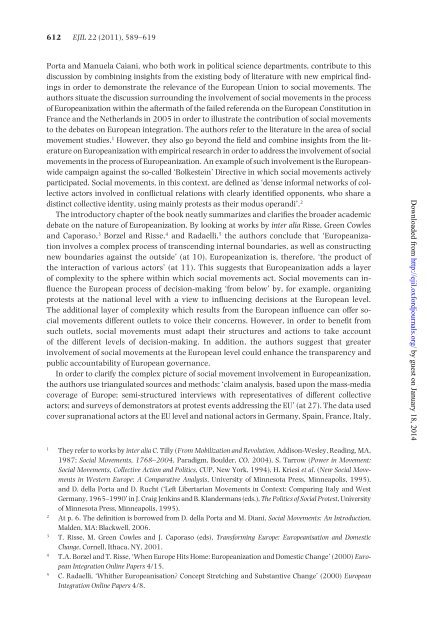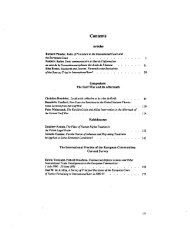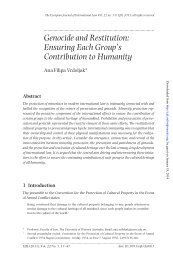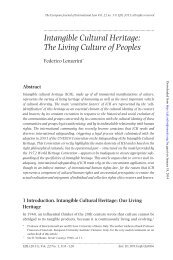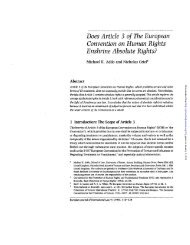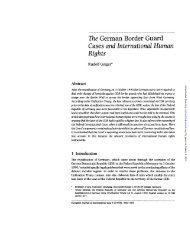Donatella della Porta and Manuela Caiani. Social Movements and ...
Donatella della Porta and Manuela Caiani. Social Movements and ...
Donatella della Porta and Manuela Caiani. Social Movements and ...
Create successful ePaper yourself
Turn your PDF publications into a flip-book with our unique Google optimized e-Paper software.
612 EJIL 22 (2011), 589–619<br />
<strong>Porta</strong> <strong>and</strong> <strong>Manuela</strong> <strong>Caiani</strong>, who both work in political science departments, contribute to this<br />
discussion by combining insights from the existing body of literature with new empirical findings<br />
in order to demonstrate the relevance of the European Union to social movements. The<br />
authors situate the discussion surrounding the involvement of social movements in the process<br />
of Europeanization within the aftermath of the failed referenda on the European Constitution in<br />
France <strong>and</strong> the Netherl<strong>and</strong>s in 2005 in order to illustrate the contribution of social movements<br />
to the debates on European integration. The authors refer to the literature in the area of social<br />
movement studies. 1 However, they also go beyond the field <strong>and</strong> combine insights from the literature<br />
on Europeanization with empirical research in order to address the involvement of social<br />
movements in the process of Europeanization. An example of such involvement is the Europeanwide<br />
campaign against the so-called ‘Bolkestein’ Directive in which social movements actively<br />
participated. <strong>Social</strong> movements, in this context, are defined as ‘dense informal networks of collective<br />
actors involved in conflictual relations with clearly identified opponents, who share a<br />
distinct collective identity, using mainly protests as their modus oper<strong>and</strong>i’. 2<br />
The introductory chapter of the book neatly summarizes <strong>and</strong> clarifies the broader academic<br />
debate on the nature of Europeanization. By looking at works by inter alia Risse, Green Cowles<br />
<strong>and</strong> Caporaso, 3 Borzel <strong>and</strong> Risse, 4 <strong>and</strong> Radaelli, 5 the authors conclude that ‘Europeanization<br />
involves a complex process of transcending internal boundaries, as well as constructing<br />
new boundaries against the outside’ (at 10). Europeanization is, therefore, ‘the product of<br />
the interaction of various actors’ (at 11). This suggests that Europeanization adds a layer<br />
of complexity to the sphere within which social movements act. <strong>Social</strong> movements can influence<br />
the European process of decision-making ‘from below’ by, for example, organizing<br />
protests at the national level with a view to influencing decisions at the European level.<br />
The additional layer of complexity which results from the European influence can offer social<br />
movements different outlets to voice their concerns. However, in order to benefit from<br />
such outlets, social movements must adapt their structures <strong>and</strong> actions to take account<br />
of the different levels of decision-making. In addition, the authors suggest that greater<br />
involvement of social movements at the European level could enhance the transparency <strong>and</strong><br />
public accountability of European governance.<br />
In order to clarify the complex picture of social movement involvement in Europeanization,<br />
the authors use triangulated sources <strong>and</strong> methods: ‘claim analysis, based upon the mass-media<br />
coverage of Europe; semi-structured interviews with representatives of different collective<br />
actors; <strong>and</strong> surveys of demonstrators at protest events addressing the EU’ (at 27). The data used<br />
cover supranational actors at the EU level <strong>and</strong> national actors in Germany, Spain, France, Italy,<br />
Downloaded from http://ejil.oxfordjournals.org/ by guest on January 18, 2014<br />
1<br />
They refer to works by inter alia C. Tilly (From Mobilization <strong>and</strong> Revolution, Addison-Wesley, Reading, MA,<br />
1987; <strong>Social</strong> <strong>Movements</strong>, 1768–2004, Paradigm, Boulder, CO, 2004), S. Tarrow (Power in Movement:<br />
<strong>Social</strong> <strong>Movements</strong>, Collective Action <strong>and</strong> Politics, CUP, New York, 1994), H. Kriesi et al. (New <strong>Social</strong> <strong>Movements</strong><br />
in Western Europe: A Comparative Analysis, University of Minnesota Press, Minneapolis, 1995),<br />
<strong>and</strong> D. <strong>della</strong> <strong>Porta</strong> <strong>and</strong> D. Rucht (‘Left Libertarian <strong>Movements</strong> in Context: Comparing Italy <strong>and</strong> West<br />
Germany, 1965–1990’ in J. Craig Jenkins <strong>and</strong> B. Kl<strong>and</strong>ermans (eds.), The Politics of <strong>Social</strong> Protest, University<br />
of Minnesota Press, Minneapolis, 1995).<br />
2<br />
At p. 6. The definition is borrowed from D. <strong>della</strong> <strong>Porta</strong> <strong>and</strong> M. Diani, <strong>Social</strong> <strong>Movements</strong>: An Introduction,<br />
Malden, MA: Blackwell, 2006.<br />
3<br />
T. Risse, M. Green Cowles <strong>and</strong> J. Caporaso (eds), Transforming Europe: Europeanisation <strong>and</strong> Domestic<br />
Change, Cornell, Ithaca, NY, 2001.<br />
4<br />
T.A. Borzel <strong>and</strong> T. Risse, ‘When Europe Hits Home: Europeanization <strong>and</strong> Domestic Change’ (2000) European<br />
Integration Online Papers 4/15.<br />
5<br />
C. Radaelli, ‘Whither Europeanisation? Concept Stretching <strong>and</strong> Substantive Change’ (2000) European<br />
Integration Online Papers 4/8.


